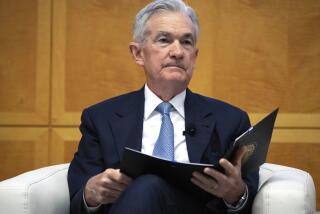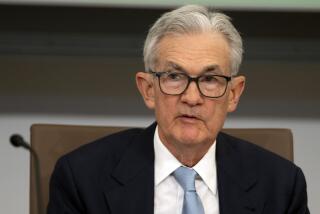Greenspan Sees No Recession This Year : Economy: But his forecast projects significantly lower growth than the Administration’s.
- Share via
WASHINGTON — Federal Reserve Chairman Alan Greenspan today expressed “guarded optimism” that the country can avoid a recession this year but he released an economic forecast projecting significantly lower growth than the Bush Administration does.
Greenspan’s scenario for sluggish growth could dash the Administration’s hopes of making significant progress on reducing the federal budget deficit.
Greenspan commented in an annual appearance before Congress to reveal the central bank’s all-important monetary and economic growth targets for the new year.
The testimony bolstered the belief among many private economists that the Federal Reserve Board is not likely to move soon to push interest rates lower.
Greenspan emphasized a belief that the economy appears to be rebounding from an extremely sluggish October-December period while at the same time inflationary pressures remain at unacceptable levels.
The Fed chairman cited a string of recent economic reports showing a rebound in economic activity in January, ranging from rising auto sales to a big jump in housing construction.
“From these and similar data, one can infer the beginnings of a modest firming in economic activity,” Greenspan told a House Banking subcommittee.
“While we cannot be certain that we are as yet out of the recessionary woods, such evidence warrants at least guarded optimism,” he said. “Available indicators of near-term economic performance suggest that the weakest point may have passed.”
Greenspan’s testimony served to reaffirm statements he made three weeks ago in another congressional appearance.
The Fed’s economic forecast showed that the central bank expects the economy, as measured by gross national product, to grow at an anemic rate of between 1.75% and 2% this year.
That is far below the Administration’s projection that the economy will grow 2.6% this year, when measured from the fourth quarter of 1989.
The Administration is pinning its hopes of cutting the federal budget deficit in half on a belief that economic growth will rebound significantly in 1990 from the depressed level in the fourth quarter, when the GNP rose at an annual rate of just 0.5%, its poorest showing in 3 1/2 years.
But if, as appears likely, the Fed pursues a tighter credit policy to dampen inflationary pressures, then interest rates will be higher than the Administration is forecasting and growth will be slower--two developments that will add billions of dollars to the budget deficit.
The Fed’s economic forecast for 1990 represented only a modest change from a preliminary estimate the central bank made last June when it forecast growth of 1.5% to 2%.
However, the Fed substantially lowered its inflation estimate to 4% to 4.5% for consumer prices, down from a June forecast of 4.5% to 5%, signaling perhaps a renewed emphasis on getting prices lower.
Greenspan said that while consumer prices for January, scheduled to be reported Wednesday, will show a sizable jump due to energy and food costs, a reversal of this temporary spurt “is apparently under way.”
More to Read
Get the L.A. Times Politics newsletter
Deeply reported insights into legislation, politics and policy from Sacramento, Washington and beyond. In your inbox twice per week.
You may occasionally receive promotional content from the Los Angeles Times.










